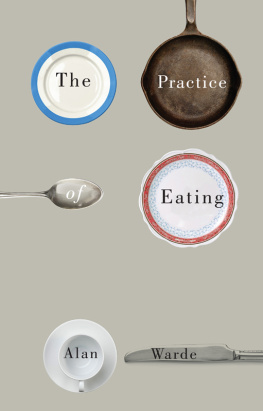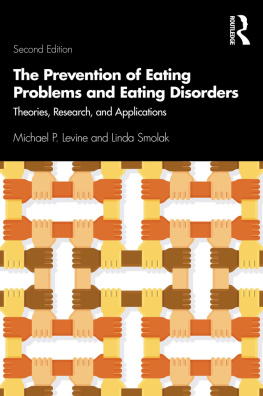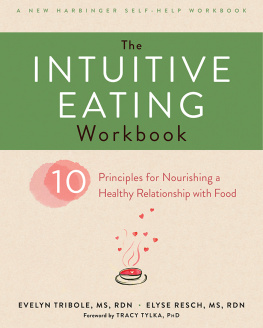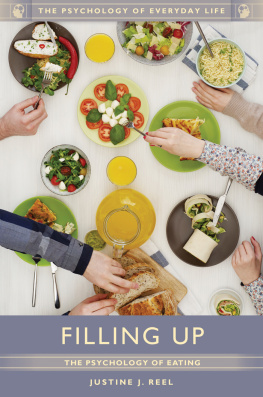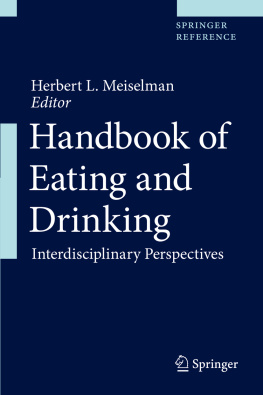
Copyright page
Copyright Alan Warde 2016
The right of Alan Warde to be identified as Author of this Work has been asserted in accordance with the UK Copyright, Designs and Patents Act 1988.
First published in 2016 by Polity Press
Polity Press
65 Bridge Street
Cambridge CB2 1UR, UK
Polity Press
350 Main Street
Malden, MA 02148, USA
All rights reserved. Except for the quotation of short passages for the purpose of criticism and review, no part of this publication may be reproduced, stored in a retrieval system, or transmitted, in any form or by any means, electronic, mechanical, photocopying, recording or otherwise, without the prior permission of the publisher.
ISBN-13: 978-0-7456-9170-1
ISBN-13: 978-0-7456-9171-8(pb)
A catalogue record for this book is available from the British Library.
Library of Congress Cataloging-in-Publication Data
Warde, Alan.
The practice of eating / Alan Warde.
pages cm
Includes bibliographical references and index.
ISBN 978-0-7456-9170-1 (hardback) ISBN 978-0-7456-9171-8 (pbk.) 1. Food habitsSocial aspects. 2. Food consumptionSicial aspects. I. Title.
GN407.W36 2015
394.12dc23
2015019447
Typeset in 10.5 on 12 pt Sabon
by Toppan Best-set Premedia Limited
Printed and bound in Great Britain by CPI Group (UK) Ltd, London
The publisher has used its best endeavours to ensure that the URLs for external websites referred to in this book are correct and active at the time of going to press. However, the publisher has no responsibility for the websites and can make no guarantee that a site will remain live or that the content is or will remain appropriate.
Every effort has been made to trace all copyright holders, but if any have been inadvertently overlooked the publisher will be pleased to include any necessary credits in any subsequent reprint or edition.
For further information on Polity, visit our website:
politybooks.com
Acknowledgements
The material for this book was compiled over more than a decade and I have incurred many personal and intellectual debts along the way. The research upon which it is based has been supported materially by the University of Manchester through periods of sabbatical leave, and by the Economic and Social Research Council. A substantial part of the work was conducted at the Helsinki Collegium for Advanced Studies, University of Helsinki, where I had the privilege to spend two years from 2010 as the Jane and Aatos Erkko Visiting Professor in Studies on Contemporary Society as a guest of the Erkko Foundation. To these sponsors of my work I record my gratitude. At the University of Manchester I have worked with very many stimulating and helpful colleagues: through the Centre for Research on Innovation and Competition, the Sustainable Consumption Institute and in the Department of Sociology in the School of Social Sciences, I have been able to discuss many of my ideas in a congenial atmosphere with teachers, research staff and research students. They are too many to name. Friends and colleagues who made a particular contribution to this book as a result of having worked alongside me as co-researchers on projects about food and eating include Lydia Martens, Dale Southerton, Isabelle Darmon, Luke Yates, Cecilia Daz-Mndez, Mark Harvey, Andrew McMeekin, Modesto Gayo-Cal, Corinne Wales, Tony Bennett, Mike Savage, Elizabeth Silva, David Wright, Unni Kjaernes, Lotte Holm, Mark Tomlinson, Svetlana Kirichenko, Mette Ranta, Wendy Olsen and Shu-Li Cheng. Sincere thanks to all of them. I owe an even greater debt to four people who read the whole of the draft typescript of the book, Jukka Gronow, Anne Murcott, Sue Scott and Dale Southerton. I am profoundly grateful to them. While I have not been able to incorporate all their insightful comments and suggestions, the book would be immeasurably poorer were it not for their generous and kind efforts. I also benefited from the advice of three readers for Polity Press and from the efficient and patient management of the process of publication by Elliott Karstadt.
Alan Warde
Manchester, April 2015
Some of the chapters in this book have been revised in small or large part for publication here. The author and publishers would like to thank the following publishers for permission to reprint:
Oxford University Press for extracts (4 paragraphs) from Ch. 12, Sociology, Consumption, and Habit from Alistair Ulph and Dale Southerton (eds) (2014), Sustainable Consumption: Multi-Disciplinary Perspectives in Honour of Professor Sir Partha Dasgupta, pp. 27798; and extract (three paragraphs) from Ch. 19, Eating in Frank Trentmann (ed.) (2012), Oxford Handbook of the History of Consumption, pp. 37695. Reprinted with permission.
Sage Publications for Consumption and the Theory of Practice (2005), Journal of Consumer Culture 5(2): 13154, and After Taste: Culture, Consumption and Theories of Practice (2014), Journal of Consumer Culture 14(3): 279303.
Routledge (Taylor and Francis Group) for What Sort of a Practice is Eating?, in Elizabeth Shove and Nicola Spurling (eds) (2013), Sustainable Practices: Social Theory and Climate Change, pp. 1730.
Introduction
Eating as a Topic of Interest
Public interest in food has increased markedly since the 1980s and scholarly regard has expanded commensurately. Food is a political issue, a matter of leisure and recreation, a topic of health, a resource for media industries, as well as a primary necessity of daily life. Crises in the food system have spurred political parties and social movements to action. A proliferation of food programmes and journalism on television, in the press and latterly on the internet has made food and eating a growth area of popular attention and conversation (Rousseau 2012). This reflects new priorities regarding the body and body management, as states, particularly those responsible for funding health care, become more concerned with what people eat. Consequently, food has come under more intense scrutiny from social research. Some aspects of the food system have always attracted scholarly research, and the most prolific contributors remain agriculture, pharmacology, medicine, nutrition, home economics, macro-economics and psychology. However, public preoccupations have made more space for socio-cultural disciplines like anthropology, cultural studies, social geography and sociology to fill major gaps in understanding, not least with respect to failures of policy intervention.
The changing social and economic circumstances occasioned by the post-war boom in the West had the effect of making food relatively cheaper, and older problems of poverty-induced hunger and malnutrition receded. Agribusiness, sustained economic growth, multinational corporations and ever greater international trade transformed the economic foundations of western diets. Abundant, accessible and relatively cheap foodstuffs, sourced globally, presented most people with the possibility of eating in much more varied ways than had been possible for preceding generations. By the end of the twentieth century, food systems had experienced some of the most profound effects of globalization (Inglis and Gimlin 2010). Of course, this did not result in immediate or radical changes in diet or culinary practices for individuals, but there were significant shifts over a few decades at aggregate level, sufficient for serious scholars to diagnose a culinary revolution (Panayi 2008).
Next page
